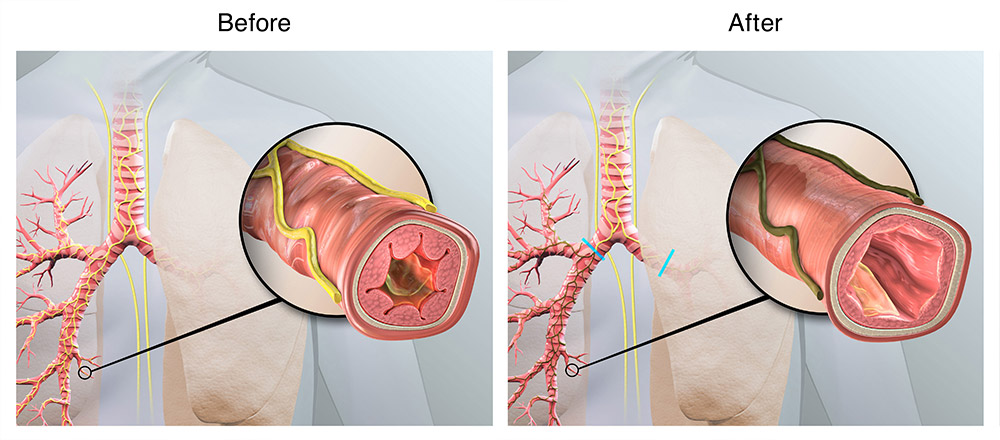Targeted lung denervation: Improving COPD patients’ lung function
Our consultants have worked with Nuvaira®, a US-based company, on a treatment for chronic obstructive pulmonary disease (COPD). The company developed a novel device to perform targeted lung denervation, a treatment which significantly reduces COPD flare-ups and minimises the chance of hospitalisation in COPD patients.
Current COPD treatments
1.2 million people in the UK are affected by COPD, with COPD exacerbations being the second most common cause of emergency hospital admissions. Most of the current treatments for COPD are based on lifestyle changes, or only provide temporary relief in the form of inhaled therapies.
Inhalers can either be short-acting, lasting just a couple of hours, or long-acting where the dose lasts for up to 24 hours.
Pulmonary rehabilitation is a commonly recommended COPD treatment which is based on lifestyle changes. It involves a specialised programme of physical exercise, dietary advice, and psychological support. In the most severe COPD cases, surgery or lung transplantation may be recommended. However, for most patients with moderate to severe COPD, there is no widely available permanent treatment.
The vagus nerve in COPD patients
Many COPD patients have an overactive vagus nerve which branches into the lungs and controls various functions. It is responsible for mucus production, as well as for stimulating the smooth muscle which lines the bronchial tubes.
Over-stimulation of the vagus nerve can lead to constricted airways filled with excess mucus, causing COPD exacerbations, and making breathing difficult for the patient.
Anticholinergic drugs work to reduce the sensitivity of the muscles lining the bronchial tubes which helps to reduce symptoms. However, the effects of these medicines are temporary and do not treat the underlying cause, which is the overactive vagus nerve.
A long-term solution for COPD
We now offer a long-term solution for COPD, designed to improve breathing, and decrease the frequency of COPD exacerbations with minimally invasive treatment.
Our consultants, Professor Pallav Shah, consultant physician in respiratory medicine, and Dr Justin Garner, consultant respiratory physician, worked with US-based company Nuvaira® to develop a new device and treatment for COPD. We’re proud to be the only providers in the UK of this treatment.
Nuvaira’s dNerva lung denervation system is carried out under general anaesthetic. It uses an electrode to interrupt communication between the vagus nerve in the lungs and the brain, providing a longer-term solution for COPD patients.
Targeted lung denervation leads to reduced symptoms, improved lung function, and higher quality of life by blocking the actions of the vagus nerve. The treatment works synergistically with anticholinergic drugs which COPD patients currently use.
Professor Shah explains, “treating the nerves in this way blocks their actions more efficiently than anticholinergic inhalers, which only work temporarily, can have an irregular distribution within the lungs, and may cause side-effects such as blurred vision and urinary retention in a small number of patients.
“This procedure keeps obstructed airways open to improve breathing and has the potential to provide a long-term improvement for all patients with COPD.”
How does targeted lung denervation work?
“A bronchoscope is passed through the mouth and down into the lungs before a catheter is passed through the bronchoscope. The catheter has a balloon and an electrode on the end, and this is what we use to deliver the treatment,” explains Dr Garner.
The electrode delivers radiofrequency energy to ablate branches of the vagus nerve. This process is what prevents the brain signals to the lung from causing a COPD exacerbation.
The radiofrequency energy is delivered in four quadrants to treat the main bronchus airway’s circumference. Both lungs are treated in the same session, taking around 90 minutes in total.
Following the treatment, the brain’s signals do not reach the lungs, which prevents excess mucus production. The bronchial tubes also relax, allowing air to pass more freely into and out of the lungs.
Over the last nine years, Nuvaira®’s trials have shown very promising results. “We’ve seen significant improvements, particularly in exacerbation frequency,” says Professor Shah, “which translates to reduced admissions to hospital and a better quality of life.”

Airway before and after targeted lung denervation, with less mucus and swelling shown after the Nuvaira® Lung Denervation System
Contraindications for targeted lung denervation
“For patients with severe airflow limitation, who are not responding well to maximal medical therapy, this treatment offers alternative means to try and improve their quality of life and reduce the frequency of their flares,” explains Professor Shah.
Suitability criteria for targeted lung denervation includes:
- moderate to severe COPD
- history of COPD exacerbations
- high symptom burden
- aged 40-75
- BMI of 18-35
Patients must also have stopped smoking or vaping for at least two months prior to treatment, as this can exacerbate COPD symptoms.
Factors which may preclude a patient from treatment include having:
- active asthma
- ongoing gastrointestinal-related symptoms
- implanted electronic devices
Due to the radiofrequency that is delivered during targeted lung denervation, if a patient has an implantable electronic device, such as a pacemaker, they are an unsuitable candidate.
When to refer to us
Targeted lung denervation treatment is available in the UK exclusively at Royal Brompton and Harefield hospitals with our specialist respiratory team.
Patients with moderate to severe COPD, a high symptom burden, and a history of COPD exacerbations can be referred to us for treatment, or to learn more about their suitability for targeted lung denervation.
Contact our customer services team to learn more about targeted lung denervation and other options for your COPD patients.
Related content
-
Chronic obstructive pulmonary disease (COPD)
Chronic obstructive pulmonary disease is a group of conditions that affect your breathing and quality of life. Learn how to effectively manage your symptoms.
-
Lung health assessment
Our lung health assessment service is accessible to patients with a range of symptoms, including breathlessness, cough, chest pain, and wheezing.
-
Targeted lung denervation: Treatment for COPD patients

